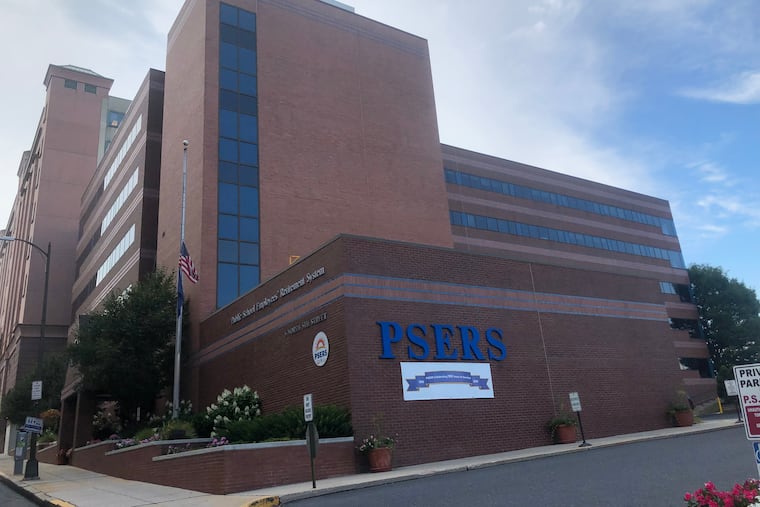Pa.’s largest pension plan admits ‘error’ that may have benefited teachers at taxpayers’ expense
The PSERS board voted unanimously to hire an outside law firm to investigate the mistake.

The board of Pennsylvania’s giant public-school pension fund on Friday voted to hire an outside law firm to investigate an error in a December financial decision that may have cost taxpayers at least $25 million in fund payments — while wrongly sparing 100,000 school employees from paying more for their pensions.
The unanimous vote followed a 3 1/3-hour closed-door meeting of the 14-member PSERS board as it explored whether it erred in a crucial meeting in December in which members concluded the fund had just barely met a key financial target for investments.
If it made such a mistake, the error could make a big difference in whether some teachers have to pay more out of their paychecks to support their pensions.
In a reform imposed by the legislature and governor, the fund adopted a so-called “risk-sharing” rule some years ago that requires educators and staff to pay extra if PSERS fails to meet its investment return target.
The target was a return of 6.36%. In December, the plan’s experts told the board that the fund’s had actually grown by 6.38% — just enough to spare teachers a hike.
The target appeared relatively easy to meet. By comparison, the S&P 500 index of big U.S. stocks paid over 10% a year during the review period covering the last nine years.
PSERS officials provided almost no details Friday, such as why the investigation was necessary. People familiar with the issue, speaking on condition they not be identified, said outside financial experts who worked on the profit assessment have now complained that the fund’s performance provided for the calculation was inflated.
The special meeting came a week after PSERS concluded its first bimonthly meeting of 2021, at which five of the 14 current board members voted against the staff’s latest investment proposals.
Those negative votes appeared to reflect a growing dissident faction, upset at investment decisions and other policies pushed by the administration of executive director Glen Grell, the former state representative who heads the $62 billion system.
In all, public school employees paid about $1.1 billion into the fund last year, while state and school taxpayers contributed almost $5 billion. Investment profits have pumped about another $3.7 billion yearly over the past 10 years. However, returns fell below that figure in the past two years.
Taxpayers have been asked routinely in recent years to pay more into the underfinanced pension plan.
But the “shared risk” rule was designed to spare the state and local school board treasuries from paying all the extra cost when investments did poorly.
If PSERS underperformed, for complex legal reasons the hike in payroll deductions would apply only to employees hired after 2011, around 100,000 of Pennsylvania’s more than 250,000 public school workers.
Most school workers pay 7.5% of their paychecks to the fund. Had the board decreed that investments fell short, their paycheck deduction would have climbed to 8%.
In a contentious discussion at the December meeting, board chairman Chris Santa Maria, a history teacher and former union leader at Lower Merion’s Harriton High School, expressed satisfaction that his fellow union members would not be charged more.
But others were uncomfortable with the data, even at that time. Then-state Treasurer Joseph M. Torsella and state Rep. Frank Ryan (R., Lebanon) noted that the figures had been gathered from different sources from the usual annual financial report.
Santa Maria and the pension staff assured them the numbers were good.
“We went back and double-checked the numbers,” Santa Maria said. Even when recalculated, he said, ”I’m confident we still come up with the same.”
He added: ”The information is now reliable and defendable.”
“We did our due diligence,” agreed James Grossman, the fund’s chief investment officer, at the same December meeting. “We covered it. I’m not worried about it.”
When the dissidents suggested a separate vote on the investment performance data, apart from the one imposing charges, board member Melva Vogler objected.
It’s “dangerous,” said Vogler, a retired math teacher from the Poconos, to send a message “that there’s something wrong with the risk-share calculation.”
Still, Torsella and Ryan were unnerved about the how close the profit figure was to the target.
They both complained about a rushed process. They abstained from the December vote, as did another frequent dissident, Richard Vague, the state banking secretary.
“We got this [report] last night,” Torsella said at the time. ”Given how close this is, I have real concerns.”
Late Friday, the board issued a statement acknowledging that a mistake had been made.
“The Pennsylvania Public School Employees’ Retirement System (PSERS) Board of Trustees was recently made aware of an error regarding the reporting of investment performance numbers which were used in the December 2020 certification. An outside consultant is in the process of analyzing the data in detail. In addition, the Board has delegated to the Audit Committee the authority to select independent outside counsel and oversee a special investigation.”